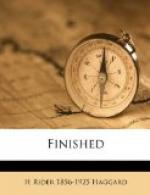“What a glorious gallop. I finished it very well, didn’t I? You couldn’t have made a better shot yourself.”
“Yes,” I answered, “you finished it very well as you will find out if you will take the trouble to open your rifle and count your cartridges. I may add that if we are going to hunt together I hope you will never lead me such a fool’s chase again.”
He rose, opened the rifle and saw that it was empty, for although he had never re-loaded he had thrown out the two cartridges which he had discharged in the glen.
“By Jingo,” he said, “you must have shot it, though I could have sworn that it was I. Quatermain, has it ever struck you what a strange thing is the human imagination?”
“Drat the human imagination,” I answered, wiping away the blood that was trickling into my eye from a thorn scratch. “Let’s look at your horse. If it is lamed you will have to ride Imagination back to the wagon which must be six miles away, that is if we can find it before dark.”
Sighing out something about a painfully practical mind, he obeyed, and when the beast was proved to be nothing more than blown and a little bruised, made remarks as to the inadvisability of dwelling on future evil events, which I reminded him had already been better summed up in the New Testament.
After this we contemplated the carcasse of the wildebeeste which it seemed a pity to leave to rot. Just then Anscombe, who had moved a few yards to the right out of the shadow of an obstructing tree, exclaimed—
“I say, Quatermain, come here and tell me if I have been knocked silly, or if I really see a quite uncommon kind of house built in ancient Greek style set in a divine landscape.”
“Temple to Diana, I expect,” I remarked as I joined him on the further side of the tree.
I looked and rubbed my eyes. There, about half a mile away, situated in a bay of the sweeping hills and overlooking the measureless expanse of bush-veld beneath, was a remarkable house, at least for those days and that part of Africa. To begin with the situation was superb. It stood on a green and swelling mound behind which was a wooded kloof where ran a stream that at last precipitated itself in a waterfall over a great cliff. Then in front was that glorious view of the bush-veld, at which a man might look for a lifetime and not grow tired, stretching away to the Oliphant’s river and melting at last into the dim line of the horizon.
The house itself also, although not large, was of a kind new to me. It was deep, but narrow fronted, and before it were four columns that carried the roof which projected so as to form a wide verandah. Moreover it seemed to be built of marble which glistened like snow in the setting sun. In short in that lonely wilderness, at any rate from this distance, it did look like the deserted shrine of some forgotten god.




